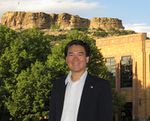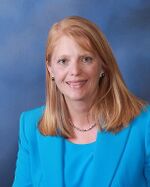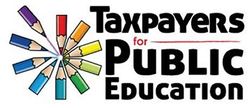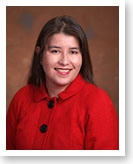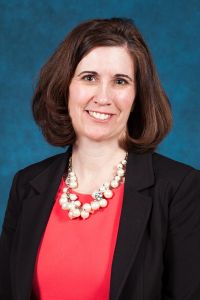Douglas County School District elections (2017)
2019 →
← 2015 |
|---|
|
|
| Enrollment (14-15) |
|
|
Four of the seven seats on the Douglas County School District Board of Education in Colorado were up for nonpartisan general election on November 7, 2017. The election ended an eight-year governing majority on the board that voted to implement a pay-for-performance system for teachers and a voucher program for private schools.
Two slates of candidates ran to either continue the existing majority's policies or to change them, and the slate that advocated to change policies won the election. No incumbents filed to run in the race, which guaranteed four new members were elected to the District B, D, E, and G seats on the board. The winners of the 2017 election were also tasked with appointing the district's next superintendent. The board voted in January 2017 to extend the contract of interim Superintendent Erin Kane through the 2017-2018 school year.[1][2][3][4]
A list of the candidates and the board majority at the time of the election can be found in the table below. Members of the Elevate Douglas County slate said that they were not linked to the board's majority members, but they did come out in support of some the majority's policies. Members of the Community Matters slate were endorsed by an organization that also endorsed candidates who opposed the governing majority in 2015.[5][6][7] For details on candidates' individual stances on the voucher program, superintendent, special education, and teacher pay click here.
Electing newcomers was not unusual for the district. Newcomers swept the ballot in the district's 2015 election, and another two newcomers were elected to the board in 2013. For information on election trends in the district, click here. Despite the new members added each year, a specific majority controlled the board from 2009 to 2017. They maintained a 7-0 majority on the board for six years. In the district's 2015 election, three incumbents were defeated, and the board's majority decreased to 4-3.[3][8]
Elections
Voter and candidate information
The Douglas County Board of Education consists of seven members elected to four-year terms. Board members are limited to serving two consecutive terms. Elections are held on a staggered basis so that three or four seats are up for election every odd-numbered year in November. Though members run for seats in specific geographic districts, elections are held at large.[9]
To qualify to run for school board, candidates had to be residents of the school district and registered voters for a minimum of 12 consecutive months before the election. They also could not have been convicted of a sexual offense against a child. To get on the ballot, school board candidates had to file nomination petitions containing 50 signatures of eligible voters in the school district by September 1, 2017.[10]
Colorado voters were allowed to register to vote through election day.[11] Photo identification was not required to vote in Colorado.[12]
Candidates and results
District B
Results
| Douglas County School District, District B General Election, 4-year term, 2017 |
||
|---|---|---|
| Candidate | Vote % | Votes |
| 58.65% | 52,937 | |
| Ryan Abresch | 41.35% | 37,321 |
| Total Votes | 90,258 | |
| Source: Colorado Secretary of State, "Official Results," accessed August 28, 2023 | ||
Candidates
| Ryan Abresch | Anthony Graziano | ||
|---|---|---|---|
|
| ||
District D
Results
| Douglas County School District, District D General Election, 4-year term, 2017 |
||
|---|---|---|
| Candidate | Vote % | Votes |
| 58.23% | 52,545 | |
| Randy Mills | 41.77% | 37,697 |
| Total Votes | 90,242 | |
| Source: Colorado Secretary of State, "Official Results," accessed August 28, 2023 | ||
Candidates
| Randy Mills | Chris Schor | ||
|---|---|---|---|
|
| ||
District E
Results
| Douglas County School District, District E General Election, 4-year term, 2017 |
||
|---|---|---|
| Candidate | Vote % | Votes |
| 58.00% | 52,314 | |
| Grant Nelson | 42.00% | 37,889 |
| Total Votes | 90,203 | |
| Source: Colorado Secretary of State, "Official Results," accessed August 28, 2023 | ||
Candidates
| Kevin Leung |
Grant Nelson | ||
|---|---|---|---|
|
| ||
District G
Results
| Douglas County School District, District G General Election, 4-year term, 2017 |
||
|---|---|---|
| Candidate | Vote % | Votes |
| 57.62% | 52,018 | |
| Debora Scheffel | 42.38% | 38,267 |
| Total Votes | 90,285 | |
| Source: Colorado Secretary of State, "Official Results," accessed August 28, 2023 | ||
Candidates
| Krista Holtzmann |
Debora Scheffel | ||
|---|---|---|---|
|
| ||
Additional elections on the ballot
- See also: Colorado elections, 2017
The Douglas County Board of Education election shared the ballot with a ballot question for the city of Castle Rock.[13] The question appeared on the ballot as follows:
| “ | Shall the Town of Castle Rock Home Rule Charter be amended to provide that the Town Council, the seven-member governing body of the Town, consist of a Mayor elected by all of the electors of the Town for a four-year term, with the Mayor's service limited to two four-year terms, and six Councilmembers who are elected for four-year terms by the electors of the district where each Councilmember resides? | ” |
Key deadlines
The following dates were key deadlines for the 2017 Colorado school board elections.[15][16]
Endorsements
The organization Douglas County Parents endorsed the members of the Community Matters slate: Anthony Graziano, Chris Schor, Kevin Leung, and Krista Holtzmann.[6] They were also endorsed by 12 former Douglas County Board of Education members. Click here to read their letter of support that was published in The Denver Post.
The Elevate Douglas County slate—Ryan Abresch, Randy Mills, Grant Nelson, and Debora Scheffel—were endorsed by the following organizations and elected officials:[17][18][19]
|
|
Do you know of an official or organization that endorsed a candidate in this race? Let Ballotpedia know by email at editor@ballotpedia.org.
Campaign finance
Candidates
Candidates received a total of $231,154.94 and spent a total of $223,332.78 in the election, according to the Colorado Secretary of State. Together, the four Elevate Douglas County slate candidates raised $147,586.03 and spent $139,913.35, while the four Community Matters slate candidates together raised $83,568.91 and spent $83,419.43.[20]
| Candidate | Contributions | Expenditures | Cash on hand |
|---|---|---|---|
| District B | |||
| Ryan Abresch (Elevate Douglas County slate) |
$29,943.98 | $29,907.67 | $36.31 |
| Anthony Graziano (Community Matters slate) |
$20,217.16 | $20,217.16 | $0.00 |
| District D | |||
| Randy Mills (Elevate Douglas County slate) |
$36,918.98 | $35,744.17 | $1,174.81 |
| Chris Schor (Community Matters slate) |
$20,388.12 | $20,388.12 | $0.00 |
| District E | |||
| Kevin Leung (Community Matters slate) |
$19,991.61 | $19,842.13 | $149.48 |
| Grant Nelson (Elevate Douglas County slate) |
$44,647.98 | $40,138.63 | $4,509.35 |
| District G | |||
| Krista Holtzmann (Community Matters slate) |
$22,972.02 | $22,972.02 | $0.00 |
| Debora Scheffel (Elevate Douglas County slate) |
$36,075.09 | $34,122.88 | $1,952.21 |
Reporting requirements for candidates
School board candidates in Colorado were required to file three campaign finance reports. The reports were due on October 17, 2017, November 3, 2017, and December 7, 2017.[16]
Non-candidates
- See also: Satellite spending
Organizations and committees that were not connected to candidates also raised and spent funds for the board of education election. As of October 31, 2017, the Douglas Schools for Douglas Kids committee, which supported the Community Matters slate of candidates, had spent $266,422.[21] It received $300,000 from the American Federation of Teachers and $100,000 from Citizens for Integrity earlier in the election cycle.[22] The organization Douglas County Parents, which endorsed the Community Matters slate of candidates, had spent $28,241 as of October 17, 2017.[17]
An independent expenditure committee for the Colorado Republican Committee had spent approximately $79,000 to support the Elevate Douglas County slate of candidates as of October 31, 2017.[21] The organization Americans for Prosperity did not contribute funds to a committee in direct support of candidates in this election, but it did pledge to give a six-figure amount to promote school choice in the district. The exact amount spent by Americans for Prosperity was unknown as campaign finance law did not require funds to be reported if they were spent on issues rather than on candidates.[17]
Past elections
To see results from past elections in the Douglas County School District, click here.
What was at stake?
Candidates on the issues
School district voucher program
In 2011, the Douglas County School District created the Douglas County Choice Scholarship Program, which sought to provide publicly-funded scholarships, or vouchers, to students to attend any school of their choice, including private and religious schools. The program never went into effect due to court challenges. The Colorado Supreme Court ruled that the program was unconstitutional in 2015, but the U.S. Supreme Court told the state court to reconsider its ruling on June 27, 2017. The state supreme court did not take up the case prior to the school board election.[23] Click here to jump further down the page and read more about this case.
In a survey, Chalkbeat Colorado asked the Douglas County Board of Education candidates if they would continue to fight to legalize the voucher program. The table below shows the answers they provided.[24]
| "If elected, would you continue the district's legal fight to enact a private school voucher system? Why or why not?" | |||||||
|---|---|---|---|---|---|---|---|
| Candidate | Survey response | ||||||
| District B | |||||||
| Ryan Abresch (Elevate Douglas County slate) |
| ||||||
| Anthony Graziano (Community Matters slate) |
| ||||||
| District D | |||||||
| Randy Mills (Elevate Douglas County slate) |
Candidate did not respond to the survey. | ||||||
| Chris Schor (Community Matters slate) |
| ||||||
| District E | |||||||
| Kevin Leung (Community Matters slate) |
| ||||||
| Grant Nelson (Elevate Douglas County slate) |
| ||||||
| District G | |||||||
| Krista Holtzmann (Community Matters slate) |
| ||||||
| Debora Scheffel (Elevate Douglas County slate) |
| ||||||
Next superintendent
The Douglas County Board of Education voted in January 2017 to extend the contract of interim Superintendent Erin Kane through the 2017-2018 school year. Because of this, the winners of the 2017 election were tasked with appointing the district's next superintendent.[2] Click here to jump further down the page and read about the decision to extend Kane's contract.
In a survey, Chalkbeat Colorado asked the 2017 candidates what characteristics they wanted to see in the district's next superintendent. The table below shows the answers they provided.[24]
| "One of your most important tasks will be to select a new superintendent for the district. What characteristics will you seek in a new leader?" | |||||||
|---|---|---|---|---|---|---|---|
| Candidate | Survey response | ||||||
| District B | |||||||
| Ryan Abresch (Elevate Douglas County slate) |
| ||||||
| Anthony Graziano (Community Matters slate) |
| ||||||
| District D | |||||||
| Randy Mills (Elevate Douglas County slate) |
Candidate did not respond to the survey. | ||||||
| Chris Schor (Community Matters slate) |
| ||||||
| District E | |||||||
| Kevin Leung (Community Matters slate) |
| ||||||
| Grant Nelson (Elevate Douglas County slate) |
| ||||||
| District G | |||||||
| Krista Holtzmann (Community Matters slate) |
| ||||||
| Debora Scheffel (Elevate Douglas County slate) |
| ||||||
Special education
The U.S. Supreme Court ruled in Endrew F. v. Douglas County School District that public school districts had to meet higher standards in their special education programs in March 2017.[25] Click here to jump further down the page to read about the case.
Chalkbeat Colorado asked the 2017 candidates how they thought the school district should reform its special education programs. The table below shows the answers they provided.[24]
| "What sort of reforms do you believe the district's special education program should consider?" | |||||||
|---|---|---|---|---|---|---|---|
| Candidate | Survey response | ||||||
| District B | |||||||
| Ryan Abresch (Elevate Douglas County slate) |
| ||||||
| Anthony Graziano (Community Matters slate) |
| ||||||
| District D | |||||||
| Randy Mills (Elevate Douglas County slate) |
Candidate did not respond to the survey. | ||||||
| Chris Schor (Community Matters slate) |
| ||||||
| District E | |||||||
| Kevin Leung (Community Matters slate) |
| ||||||
| Grant Nelson (Elevate Douglas County slate) |
| ||||||
| District G | |||||||
| Krista Holtzmann (Community Matters slate) |
| ||||||
| Debora Scheffel (Elevate Douglas County slate) |
| ||||||
Teacher pay
The Douglas County School District started a pay-for-performance system for teachers in 2012. Salary levels for teachers for the 2017-2018 school year were based on expertise, education, and performance evaluations conducted by teacher supervisors.[26][27] Click here to read about the teacher salary system in the district.
In a survey, Chalkbeat Colorado asked the 2017 candidates if they would change how the district paid its teachers. The table below shows the answers they provided.[24]
| "If elected, would you seek to make changes to the way the district pays its teachers? How?" | |||||||
|---|---|---|---|---|---|---|---|
| Candidate | Survey response | ||||||
| District B | |||||||
| Ryan Abresch (Elevate Douglas County slate) |
| ||||||
| Anthony Graziano (Community Matters slate) |
| ||||||
| District D | |||||||
| Randy Mills (Elevate Douglas County slate) |
Candidate did not respond to the survey. | ||||||
| Chris Schor (Community Matters slate) |
| ||||||
| District E | |||||||
| Kevin Leung (Community Matters slate) |
| ||||||
| Grant Nelson (Elevate Douglas County slate) |
| ||||||
| District G | |||||||
| Krista Holtzmann (Community Matters slate) |
| ||||||
| Debora Scheffel (Elevate Douglas County slate) |
| ||||||
Issues in the election
U.S. Supreme Court tells state court to reconsider ruling on school district voucher program
On June 27, 2017, the U.S. Supreme Court told the Colorado Supreme Court to reconsider its 2015 decision to rule a voucher program created by the Douglas County School District unconstitutional. The program, called the Douglas County Choice Scholarship Program, sought to provide publicly-funded scholarships, or vouchers, to students to attend any school of their choice, including private and religious schools. It was approved by the board of education in 2011, but it never went into effect due to court challenges.[23][28][29]
The Douglas County Choice Scholarship Program was first blocked by the Denver District Court after Taxpayers for Public Education filed a lawsuit against its implementation. The American Civil Liberties Union (ACLU) of Colorado also challenged the program. The school district appealed the decision to the Colorado Supreme Court, which ruled the program unconstitutional due to a law in the Colorado Constitution called the Blaine Amendment. The Blaine Amendment was written to not allow public funds to be used for religious purposes, including religious schools.[23][28][29][30]
The U.S. Supreme Court did not address the state's Blaine Amendment directly when it sent the case back to the state supreme court. On June 26, 2017, however, it ruled in Trinity Lutheran Church v. Comer that churches could not be excluded from state programs that were open to other charitable organizations when benefits met a secular need, such as repaving a playground. Supporters of the school district's voucher program approved that decision, and officials from the school district said they were encouraged by the U.S. Supreme Court's ruling. “We look forward to the Colorado Supreme Court’s second review and decision on this important matter,” said the district’s legal counsel, William Trachman. “As always, the Douglas County School District is dedicated to empowering parents to find the best educational options for their children.”[23][30]
“It’s our hope that a decision now by the Colorado Supreme Court will allow us to put kids into the conversation about the best way to deliver the best education possible for them,” said Douglas County Board of Education President Meghann Silverthorn. She was the only member of the 2017 board who had also served when the board voted to start the voucher program in 2011.[23][31]
Taxpayers For Public Education said that prohibiting the payment of public funds to religious schools "upholds the vital principal[sic], enshrined in the anti-establishment clause of the First Amendment of the U.S. Constitution, that the government cannot and should not be involved in the support of any religion.”[23]
“The Supreme Court in Trinity Lutheran expressly noted that its opinion does not address religious uses of government funding,” said Mark Silverstein, legal director of the ACLU of Colorado. “Using public money to teach religious doctrine to primary and secondary students is substantially different than using public money to resurface a playground.”[30]
The Colorado Supreme Court was given three options in reconsidering its 2015 decision. "It may revise its earlier opinion, request new arguments from both sides or ask a lower court to reconsider the case," according to Chalkbeat Colorado.[30]
The newcomers elected in the district's school board election on November 7, 2017, joined the former governing minority of the board to vote to end the voucher program on December 4, 2017. The motion also directed the school district to end the legal case. The vote was 6-0, with newly elected member Kevin Leung recusing himself as he was a plaintiff in the case.[32]
Board extends interim superintendent's contract
The Douglas County Board of Education voted 5-2 on January 17, 2017, to extend the contract of interim Superintendent Erin Kane through the 2017-2018 school year. Kane took on the role of interim superintendent in July 2016, after former Superintendent Elizabeth Fagen resigned from the position. Before the January 2017 vote, Kane's contract was set to expire on September 1, 2017.[2]
Board member Steven Peck argued in favor of extending Kane's contract.[2] In a statement, he said:
| “ | Selection of a new leader a few months ahead of an election isn't fair to the newly elected board who will assume responsibility following the November 2017 election. The new board should be given an opportunity to shape the trajectory of the district. That may result in a permanent contract for Ms. Kane or it may not, but the voters should have their voices heard.[14] | ” |
| —Steven Peck (January 2017)[2] | ||
Board member James Geddes agreed with Peck. "If the board becomes substantially changed, then that board should choose the next superintendent," said Geddes.[2]
Board members David Ray and Anne Marie Lemieux voted against the extension. Board member Wendy Vogel also initially opposed the extension, but she voted in favor after a 20 percent bonus for Kane was taken out of the contract. Those three board members made up the board's three-member governing minority prior to the 2017 election, which voted to hire a different candidate when Kane was first appointed to the interim superintendent position.[3][2]
Ray said he was unprepared for the vote on Kane's contract extension. He said that there should have been better communication about the issue on the board and that it should have been voted on earlier in the school year. "It just didn't evolve the way I thought it should," said Ray.[2]
Lemieux said she wanted to hear more input from the community before voting on the contract extension, and she also said she did not agree with keeping an interim superintendent for so long. "You want to know what creates chaos and instability? It's keeping an interim indefinitely," said Lemieux.[2]
Kane said she did not expect to serve as interim superintendent for more than one year, but she said she would like to continue to help and bring stability to the school district. She also said she did not know if she would apply for the full superintendent position. "I can't predict what the district will look like in a year," said Kane.[2]
U.S. Supreme Court rules in favor of special education student, against school district
The U.S. Supreme Court ruled 8-0 in favor of a special education student in Endrew F. v. Douglas County School District on March 22, 2017. The case was brought against the school district by parents of a student with autism and attention deficit disorder. They said the district had not provided an adequate education plan for their son and sought reimbursement for the cost of sending him to a private school. The court ruled in favor of the student and his family and said that public school districts had to meet higher standards by designing programs for students to make progress in light of their disabilities.[25][33]
The case looked at requirements set up by the Individuals with Disabilities Education Act, which requires special education students to be provided with a “free and appropriate public education.” The Supreme Court's ruling overturned a lower court's ruling by determining that the term appropriate went farther than the lower court had held.[25][33]
“When all is said and done, a student offered an educational program providing merely more than de minimis progress from year to year can hardly be said to have been offered an education at all,” said Chief Justice John Roberts. “For children with disabilities, receiving instruction that aims so low would be tantamount to sitting idly awaiting the time when they were old enough to drop out.”[25]
School officials said it could be costly to require higher standards for special education programs and said those higher standards could lead parents to make unrealistic demands, according to The Denver Post. Advocates for students with disabilities said schools had to be required to offer programs that went beyond the bare minimum.[25]
Douglas County Board of Education candidates discuss building trust
All eight candidates who ran in the 2017 election participated in a candidate forum hosted by the League of Women Voters of Arapahoe and Douglas Counties on October 3, 2017. Candidates focused on the need to build trust in the district. You can see their statements in the table below.[8]
| Douglas County Board of Education candidates on trust | |
|---|---|
| Candidate | Survey response |
| District B | |
| Ryan Abresch (Elevate Douglas County slate) |
"You need to make sure you are listening to the other side, even when you don't want to listen to them...and you need to make sure that you're both working collaboratively to come up with creative solutions to difficult problems." |
| Anthony Graziano (Community Matters slate) |
Graziano spoke of the importance of working with the community to make decisions that drive action "versus continuing to deliberate and over evaluate things that have caused instability over the last eight years." |
| District D | |
| Randy Mills (Elevate Douglas County slate) |
Mills said that trust requires stability and community involved and said, "Trust starts where your actions match your words." |
| Chris Schor (Community Matters slate) |
When asked about vouchers, Schor said, "If we want to build trust - and I keep hearing this word in this campaign - then let's answer this question honestly...I believe in public funds supporting public schools, therefore I would not support taxpayer-funded vouchers." |
| District E | |
| Kevin Leung (Community Matters slate) |
Leung said it was important for the board of education to listen to staff and advisory committee recommendations. |
| Grant Nelson (Elevate Douglas County slate) |
"Before we would consider any kind of tax increase, the first goal is to restore trust with the community." |
| Note: No quotes were available from Krista Holtzmann and Debora Scheffel about trust from the candidate forum.[8] | |
Report a story for this election
Ballotpedia researches issues in school board elections across the United States, but information availability is a challenge for us in many school districts. Please contact us about the issues that impact your local school district. Note that not all submissions may meet Ballotpedia's coverage requirements for inclusion.
Candidate survey
|
Ballotpedia invites school board candidates to participate in its annual survey. |
Election trends
- See also: School boards in session: 2015 in brief
Four newcomers were guaranteed to join the 2017 Douglas County Board of Education election as no incumbents filed to run to retain their seats. Newcomers also swept the ballot in the district's 2015 election, but they defeated three incumbents to win the seats. Two newcomers were elected to open board seats in the district’s 2013 election. Two incumbents also sought and won additional terms that year.
A specific majority faction governed the board from 2009 to 2017. Candidates who supported a pay-for-performance system for teachers and school vouchers were elected to the board that year and maintained a 7-0 majority until 2015. That year, three newcomers who opposed the majority's policies defeated incumbents, which changed the board majority to 4-3. All four seats held by the majority were on the ballot in 2017, and none of the majority members filed to run for re-election. A group of candidates opposed to the majority's policies won the race.[3][4][8]
| School board election trends | ||||||
|---|---|---|---|---|---|---|
| Year | Candidates per seat | Unopposed seats | Incumbents running for re-election | Incumbent success rate | Seats won by newcomers | |
| Douglas County School District | ||||||
| 2017 | 2.00 | 0.00% | 0.00% | Not applicable | 100.00% | |
| 2015 | 2.00 | 0.00% | 100.00% | 0.00% | 100.00% | |
| 2013 | 2.00 | 0.00% | 50.00% | 100.00% | 50.00% | |
| Colorado | ||||||
| 2015 | 1.77 | 30.77% | 55.38% | 83.33% | 53.85% | |
| United States | ||||||
| 2015 | 1.72 | 35.95% | 70.37% | 82.66% | 40.81% | |
About the district
- See also: Douglas County School District, Colorado
The Douglas County School District is located in Douglas County in central Colorado. The county seat is Castle Rock. Douglas County was home to an estimated 328,632 residents in 2016, according to the United States Census Bureau.[34] The district was the third-largest school district in the state in the 2014-2015 school year and served 66,702 students.[35]
Demographics
Douglas County outperformed Colorado as a whole in terms of higher education achievement between 2011 and 2015. The United States Census Bureau found that 56.6 percent of county residents aged 25 years and older had attained a bachelor's degree, compared to 38.1 percent of state residents. During the same time period, the median household income in the county was $102,964, compared to $60,629 statewide. The poverty rate in Douglas County was 3.4 percent, while it was 11.5 percent for the entire state.[34]
| Racial Demographics, 2016[34] | ||
|---|---|---|
| Race | Douglas County (%) | Colorado (%) |
| White | 90.9 | 87.5 |
| Black or African American | 1.4 | 4.5 |
| American Indian and Alaska Native | 0.5 | 1.6 |
| Asian | 4.6 | 3.3 |
| Native Hawaiian and Other Pacific Islander | 0.1 | 0.2 |
| Two or More Races | 2.5 | 3.0 |
| Hispanic or Latino | 8.5 | 21.3 |
Note: Percentages for race and ethnicity may add up to more than 100 percent because respondents may report more than one race and the Hispanic/Latino ethnicity may be selected in conjunction with any race. Read more about race and ethnicity in the census here.
Recent news
The link below is to the most recent stories in a Google news search for the terms Douglas County School District Colorado election. These results are automatically generated from Google. Ballotpedia does not curate or endorse these articles.
See also
| Douglas County School District | Colorado | School Boards |
|---|---|---|
|
External links
Footnotes
- ↑ Douglas County School District, "2017 School Board Election Candidates," accessed September 5, 2017
- ↑ 2.0 2.1 2.2 2.3 2.4 2.5 2.6 2.7 2.8 2.9 Castle Rock News-Press, "Douglas County School District extends interim superintendent's contract," January 18, 2017
- ↑ 3.0 3.1 3.2 3.3 Castle Rock News-Press, "District’s direction at stake in school board election," September 26, 2017
- ↑ 4.0 4.1 Douglas County Elections Office, "Unofficial Results," accessed November 7, 2017
- ↑ Castle Rock News-Press, "School board candidates tackle issues at forum," September 28, 2017
- ↑ 6.0 6.1 Douglas County Parents, "Candidates," accessed October 9, 2017
- ↑ Douglas County Parents, "Media Alert: Endorsement for School Board Candidates Lemieux, Ray and Vogel," September 1, 2015
- ↑ 8.0 8.1 8.2 8.3 Castle Rock News-Press, "Candidates touch on trust in latest Douglas County School Board forum," October 5, 2017
- ↑ Douglas County School District, "2017 School Board Director Election," accessed August 29, 2017
- ↑ Colorado Association of School Boards, "2017 Elections School Board Candidate Guide," accessed August 29, 2017
- ↑ Colorado Secretary of State, "Voter Registration FAQs," accessed August 29, 2017
- ↑ Colorado Secretary of State, "Acceptable Forms of Identification," accessed August 29, 2017
- ↑ 13.0 13.1 Castle Rock City Elections, "2017 Special Election," accessed September 13, 2017
- ↑ 14.00 14.01 14.02 14.03 14.04 14.05 14.06 14.07 14.08 14.09 14.10 14.11 14.12 14.13 14.14 14.15 14.16 14.17 14.18 14.19 14.20 14.21 14.22 14.23 14.24 14.25 14.26 14.27 14.28 14.29 Note: This text is quoted verbatim from the original source. Any inconsistencies are attributable to the original source.
- ↑ Colorado Secretary of State, "2017 Election Calendar," accessed August 28, 2017
- ↑ 16.0 16.1 Colorado Secretary of State, "2017 Biennial School Election Calendar," accessed August 28, 2017
- ↑ 17.0 17.1 17.2 Chalkbeat Colorado, "Groups with a stake in Colorado’s school board elections raise $1.5 million to influence them," October 17, 2017
- ↑ Denver Post, "Support expanded choice in Douglas County schools election," October 24, 2017
- ↑ Elevate Douglas County, "Endorsements," accessed October 30, 2017
- ↑ Colorado Secretary of State, "TRACER: Candidate Search," accessed December 15, 2017
- ↑ 21.0 21.1 Chalkbeat Colorado, "Spending on Colorado school board races by outside groups surpasses $1.5 million," October 31, 2017
- ↑ Castle Rock News-Press, "Hundreds of thousands of dollars pouring into Douglas County School Board races," October 18, 2017
- ↑ 23.0 23.1 23.2 23.3 23.4 23.5 Denver Post, "Supreme Court ruling gives Douglas County school voucher program new life," June 27, 2017
- ↑ 24.00 24.01 24.02 24.03 24.04 24.05 24.06 24.07 24.08 24.09 24.10 24.11 24.12 24.13 24.14 24.15 24.16 24.17 24.18 24.19 24.20 24.21 24.22 24.23 24.24 24.25 24.26 24.27 24.28 24.29 24.30 24.31 Chalkbeat Colorado, "We sent surveys to all the 2017 Douglas County school board candidates. Read their answers here." October 5, 2017
- ↑ 25.0 25.1 25.2 25.3 25.4 Denver Post, "Supreme Court bolsters rights of learning-disabled students in ruling on Colorado case," March 22, 2017
- ↑ Denver Post, "Douglas County starts new teacher pay plan," October 14, 2012
- ↑ Douglas County School District, "Licensed Salary Ranges: Effective July 1, 2017 - June 30, 2018," accessed October 10, 2017
- ↑ 28.0 28.1 The Colorado Independent, "Douglas County school board races could be nation’s most watched," August 3, 2017
- ↑ 29.0 29.1 The Colorado Independent, "DougCo school voucher lawsuit nearing critical junction," February 27, 2017
- ↑ 30.0 30.1 30.2 30.3 Chalkbeat Colorado, "Colorado Supreme Court ordered to reconsider Douglas County school voucher case," June 27, 2017
- ↑ Douglas County School District, "Board of Education Directory," accessed October 5, 2017
- ↑ Chalkbeat Colorado, "Douglas County school board ends controversial voucher program," December 4, 2017
- ↑ 33.0 33.1 National Public Radio, "The Supreme Court Rules In Favor Of A Special Education Student," March 22, 2017
- ↑ 34.0 34.1 34.2 United States Census Bureau, "QuickFacts: Douglas County, Colorado; Colorado," accessed August 31, 2017
- ↑ U.S. Department of Education, National Center for Education Statistics, "Common Core of Data, file ccd_lea_052_1414_w_0216161a, 2014-2015," accessed November 16, 2016
| Douglas County School District elections in 2017 | |
| Douglas County, Colorado | |
| Election date: | November 7, 2017 |
| Candidates: | District B: • Ryan Abresch • Anthony Graziano District D: • Randy Mills • Chris Schor District E: • Kevin Leung • Grant Nelson District G: • Krista Holtzmann • Debora Scheffel |
| Important information: | What was at stake? • Additional elections on the ballot • Key deadlines |








